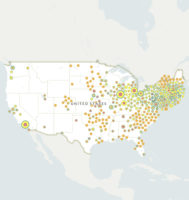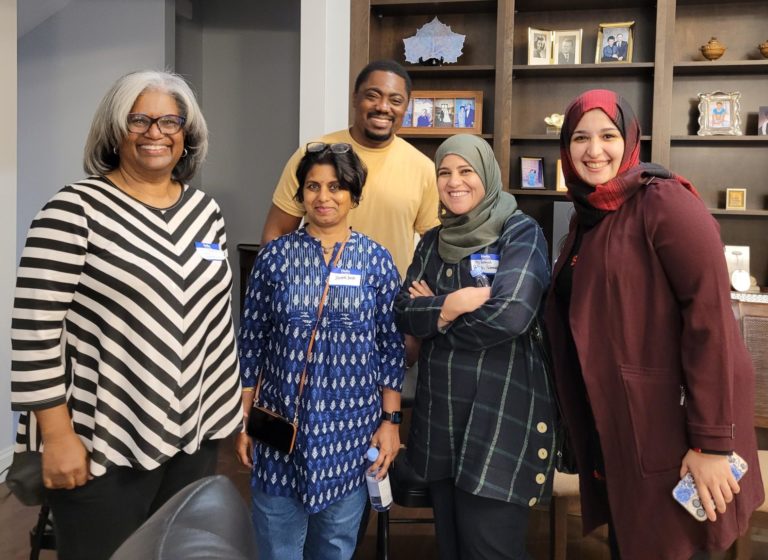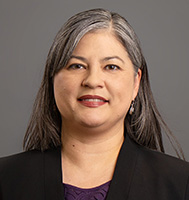The Department of Pediatrics at the University of Wisconsin School of Medicine and Public Health is committed to diversity, equity, accessibility, and inclusion as vital to our mission of clinical care, education, research, and advocacy.
Mission
We embrace the principle that a diverse, inclusive, and accessible environment is transformative, fosters mutual trust and respect, and centers health equity. The mission of DEI work within the department is to embed an anti-racist and anti-bias approach in the clinical, educational, research, and administrative activities of the Department of Pediatrics.
Vision
We aspire to build a just culture in the Department of Pediatrics, and in doing so, transform the environment to empower the dismantling of bias of all forms so that people and ideas can truly thrive.
Our Work
Health Equity Rounds
Health Equity Rounds is a longitudinal, case-based conference series and curriculum built on the belief that medical education has the power to improve health equity. Health Equity Rounds was started in 2016 when the Department of Pediatrics at Boston Medical Center recognized that few curricula existed to engage individuals as learners rather than teachers of topics including structural racism and implicit bias. The Department of Pediatrics is committed to hosting two Health Equity Rounds sessions per academic year.
IDEAA Committee
The departmental Inclusion, Diversity, Equity, Accessibility, and Anti-Racism (IDEAA) Committee is made up of faculty, staff, researchers, APPs, and trainees who are passionate about maintaining an anti-biased and anti-racist workplace. The group meets monthly to discuss departmental DEI initiatives and utilizes three main subcommittees to organized more specialized work in the areas of research, education, and community.
Department members who are interested in joining the committee can email Jenna Contreras. An updated schedule of IDEAA Committee meetings can be found on the internal Diversity, Equity, and Inclusion page. NetID required for login.
Resources
Deepen your understanding of diversity, equity, and inclusion topics and strengthen your personal commitment to anti-bias and anti-racist actions.
- Accessibility@UW–Madison — A centralized location for accessibility and disability training, guidance, and resources.
- Anti-Racist Rubric for Campus Units — A self-evaluation exercise created by the Badger Anti-Racist Coalition that helps employees identify ways their units are perpetuating racism and oppression and offers guidance in developing an action plan for change.
-
Disability and Ableism — A series of modules put together by UW Health to offer an introduction to the topics of disability and ableism.
- Inclusion@UW — Courses offered by UW–Madison’s Learning and Talent Development specifically designed for employees to learn and practice skills that build our collective capacity to promote the university’s commitment to “value the contributions of each person … and create a welcoming and inclusive community for people from every background.”
- Mitigating Bias in Recruitment and Hiring — A series of modules put together by UW Health to aid in identifying, confronting, and mitigating our own biases in the recruitment and hiring process.
- UW School of Medicine and Public Health Diversity, Equity, and Inclusion web-based modules — Courses offered by the Office of Diversity & Equity Transformation that allow learners to explore and examine the impacts of racism and discrimination.
Selected list of presentations by UW Department of Pediatrics faculty and staff intended to offer opportunities to learn about the importance of health equity and diversity and how to move toward an anti-bias and anti-racist environment.
- Health Equity Rounds: The Irreversible Outcomes of Paternalism when Recommending LARCs, Pediatric Grand Rounds, June 1, 2023
- Health Equity Rounds: An Opportunity for Clinical and Anti-Racism Learning to Intersect, UW–Madison Diversity Forum, November 15, 2022
- Health Equity Rounds: Seeking Security Pediatric Grand Rounds, April 28, 2022
- The Pandemics of COVID-19 and Racism: How to Transform Systems Built on Oppression to Systems Worthy of Trust, UW–Madison Diversity Forum, November 2, 2021
Campus-sponsored resources to help everyone feel connected.
- Badger Anti-racist Coalition — This group serves as a platform for UW professionals to actively advocate and agitate for concrete actions that support racial justice and equity on campus.
- Centennial Scholars/Clinicians Program — The Centennial Scholars/Centennial Clinicians (CS/CC) Program is designed to support departments in hiring and developing diverse faculty from groups who experience health disparities in Wisconsin. Faculty diversity enhances the quality of education, clinical care and research at the University of Wisconsin School of Medicine and Public Health.
- Graduate and Professional Students with Disabilities Wellness Initiative — The Graduate and Professional Students with Disabilities (GPSD) Initiative is a student-led group that offers a confidential environment to support GPSD in their academic and professional lives.
- UW Department of Pediatrics Residency Program Diversity, Equity, Inclusion, and Anti-Racism — Information about the Department of Pediatrics’ DEI education.
- UW Health Employee Resource Groups (ERG) — Open to UW Health and UW School of Medicine and Public Health employees, these voluntary, employee-led groups are intended to foster a diverse, inclusive workplace aligned with organizational mission, values, goals, business practices, and objectives that focus on the experience and perspectives of people of a particular race, ethnic or cultural background, gender, gender identity, religion, age cohort, sexual orientation, history of disabilities, military services, or similar other parameters.
- UW–Madison Division of Diversity, Equity & Educational Achievement affinity group gatherings — Informational social gatherings intended to help faculty and staff with underrepresented or marginalized identities come together to build community, make connections, and share resources.
- UW–Madison Multicultural Student Center — The Multicultural Student Center offers spaces, programs and services that center, affirm and celebrate the diverse and intersectional identities of students of color in order to cultivate a sense of belonging and community while strengthening all students’ capacity to learn, lead and thrive.
- UW–Madison Gender and Sexuality Campus Center — The Gender and Sexuality Campus Center provides education, outreach, advocacy, and resources for UW-Madison student communities and their allies to improve campus climate and their daily intersectional experiences.
- UW–Madison McBurney Disability Resource Center — The Disability Cultural Center (DCC) is a space to uplift, affirm, and celebrate disability identity and culture on campus.
Additional tools and resources to assist in fostering an anti-biased and anti-racist workplace.
- Collaborative Center for Health Equity (CCHE) — CCHE provides resources and services to support investigators conducting community engaged research as well as mentorship and professional development programming to achieve health equity in Wisconsin. The Center is uniquely situated to both identify and advance new health equity research endeavors, as well as mobilize research resources to support these.
- Digital accessibility guidelines — UW–Madison is committed to ensuring our digital campus is accessible and free from barriers for all members of the university community. Learn about various aspects of digital accessibility here.
- Employee Disability Resources — The Employee Disability Resources (EDR) Office offers essential information, consultation, education, and referral services to employees and applicants, Divisional Disability Representatives (DDRs), and supervisors and managers to help minimize barriers in the workplace.
- Equity, Inclusion & Engagement Policy Assessment Toolkit — This toolkit provides guidance and structure for the development of new, and examination of existing, policies to ensure a systemic approach for equitable outcomes.
- Inclusive Communications Guide — Cultivating a campus that is equitable, diverse, and inclusive is not only essential to the strength of the University of Wisconsin–Madison, but also just. Practicing inclusive communications and marketing reinforces this commitment and helps to create a more welcoming, safe, and productive campus for all students, staff, faculty, and visitors.
- Mitigating Bias in Recruitment and Hiring — A collection of resources compiled by department members.
- NameCoach — Record the proper pronunciation of your name and post it to your online profiles and email signature.
- Tips for Preventing and Responding to Microaggressions Badge Backer — Request a printed, foldable card that fits into your ID badge holder. The card includes key strategies to interrupt microaggressions, discrimination, and bigotry to make it clear that we value and stand behind our learners, staff, and faculty.
- UW Academic Calendar & Religious Observances — Planning events and meetings? Consider religious observances when setting dates. Visit the UW–Madison Academic Calendar webpage for a list of religious observances as well as instruction on how to add the Academic Calendar & Religious Observances Outlook Calendar to your own Outlook email and calendar account.
- 21-Day Racial Equity Habit Building Challenge© — Plan includes suggestions for readings, podcasts, videos, observations, and ways to form and deepen community connections.
Diversity, Equity, and Inclusion News
Recent Posts

Family-led academic grand (FLAG) rounds will highlight the unique challenges of care for children with disabilities or medical complexity
On Thursday, January 16, a special series of Department of Pediatrics Grand Rounds will commence with its inaugural presentation. A family-led academic grand rounds (FLAG rounds) will offer a new view and a unique sort …
December 9, 2024
UW–Madison Prevention Research Center receives $5 million from CDC to improve maternal and child health outcomes in Wisconsin
The University of Wisconsin–Madison Prevention Research Center has been awarded $5 million in grant funding for the next five years from the Centers for Disease Control and Prevention (CDC) to facilitate community-engaged research addressing maternal …
October 17, 2024
How old ‘redlining’ policies still affect childhood asthma risk
This article was originally published by Cincinnati Children’s and shared nationally through PR Newswire on September 24, 2024. Read the original article. An old government policy that determined who was eligible to receive government-supported home …
October 9, 2024- More DEI News posts




 Mary Ehlenbach, MD, director of diversity, equity, and inclusion, associate professor, Division of Hospital Medicine
Mary Ehlenbach, MD, director of diversity, equity, and inclusion, associate professor, Division of Hospital Medicine Jenna Contreras, strategic initiatives specialist
Jenna Contreras, strategic initiatives specialist Aaric Guerriero, MA, program manager, diversity, equity & inclusion
Aaric Guerriero, MA, program manager, diversity, equity & inclusion